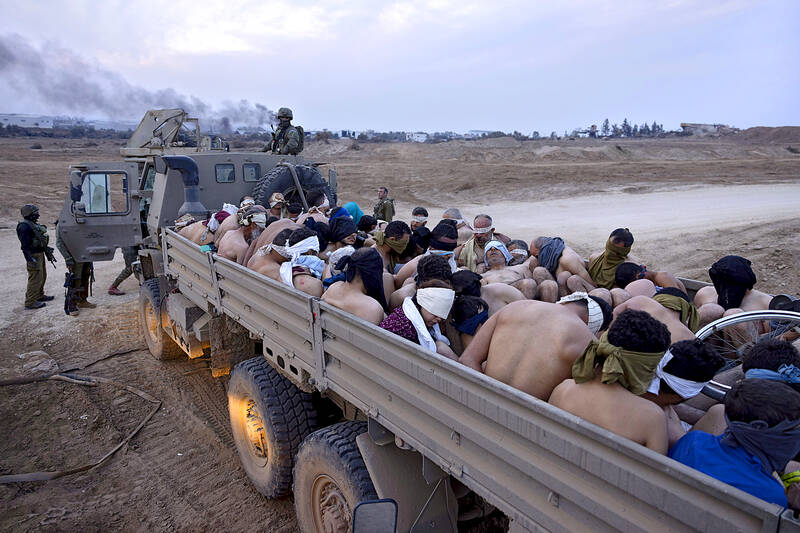In a highly rare exercise of wartime legal restraint, the Israeli Supreme Court ruled on Sunday that the Israeli government has deprived Palestinian detainees of even a minimum subsistence diet and ordered authorities to increase the amount and improve the quality of food served to deprived Palestinian inmates.
Although the Israeli Supreme Court’s top job is to advise the government of the legality of its policies, the Israeli judiciary has seldom taken issue with its actions in the 23-month Israel-Hamas war.
Since Hamas’ Oct. 7, 2023, attack on southern Israel that killed 1,200 people, mostly civilians, Israel has largely rejected growing international criticism of its conduct by saying that it was doing what was necessary to defeat Hamas.

Photo: AP
The Israeli army has detained large numbers of Palestinians in Gaza and the occupied West Bank on suspicion of militant ties. Thousands have been released from months of detention in camps and jails without charge to tell of brutal conditions, including overcrowding, scant food supplies, inadequate medical attention and scabies outbreaks.
As Israel’s highest tier of accountability, the Supreme Court hears complaints from people and organizations against Israeli government actions, such as its practice of restricting food and medical supplies to Gaza or, in this case, what two Israeli human rights groups described in their complaint as the security establishment’s “systemic policy” of depriving Palestinian prisoners of food.
The three-judge panel ruled unanimously that the Israeli government had a legal duty to provide Palestinian prisoners with three meals a day to ensure “a basic level of existence” and ordered authorities to fulfill that obligation.
In an unexpected 2-1 decision, the court furthermore accepted the petition filed last year by the Association for Civil Rights in Israel and the Israeli rights group Gisha, siding with their allegations that the government’s deliberate restriction of prisoners’ food in Israeli detention facilities has caused Palestinians to suffer malnutrition and starvation during the Israel-Hamas war.
“We are not speaking here of comfortable living or luxury, but of the basic conditions of survival as required by law,” the ruling said. “Let us not share in the ways of our worst enemies.”
Palestinian authorities have recorded the deaths at least 61 Palestinians in Israeli custody since the war started.
In March, a 17-year-old Palestinian in an Israeli prison died of what doctors said was likely starvation.
Israeli Minister of National Security Itamar Ben-Gvir, who oversees the prison system, said last year that he degraded the conditions of security prisoners to the bare minimum required by Israeli law.
Ben-Gvir, who leads a small far-right ultranationalist party, lashed out at the court ruling on Sunday.
“Are you from Israel?” he asked the judges, saying that while Israeli hostages in Gaza have no one to help them, Israel’s Supreme Court defends Hamas “to our disgrace.” He vowed the policy of providing prisoners with “the most minimal conditions stipulated by law” would continue unchanged.

LANDMARK CASE: ‘Every night we were dragged to US soldiers and sexually abused. Every week we were forced to undergo venereal disease tests,’ a victim said More than 100 South Korean women who were forced to work as prostitutes for US soldiers stationed in the country have filed a landmark lawsuit accusing Washington of abuse, their lawyers said yesterday. Historians and activists say tens of thousands of South Korean women worked for state-sanctioned brothels from the 1950s to 1980s, serving US troops stationed in country to protect the South from North Korea. In 2022, South Korea’s top court ruled that the government had illegally “established, managed and operated” such brothels for the US military, ordering it to pay about 120 plaintiffs compensation. Last week, 117 victims

China on Monday announced its first ever sanctions against an individual Japanese lawmaker, targeting China-born Hei Seki for “spreading fallacies” on issues such as Taiwan, Hong Kong and disputed islands, prompting a protest from Tokyo. Beijing has an ongoing spat with Tokyo over islands in the East China Sea claimed by both countries, and considers foreign criticism on sensitive political topics to be acts of interference. Seki, a naturalised Japanese citizen, “spread false information, colluded with Japanese anti-China forces, and wantonly attacked and smeared China”, foreign ministry spokesman Lin Jian told reporters on Monday. “For his own selfish interests, (Seki)

Argentine President Javier Milei on Sunday vowed to “accelerate” his libertarian reforms after a crushing defeat in Buenos Aires provincial elections. The 54-year-old economist has slashed public spending, dismissed tens of thousands of public employees and led a major deregulation drive since taking office in December 2023. He acknowledged his party’s “clear defeat” by the center-left Peronist movement in the elections to the legislature of Buenos Aires province, the country’s economic powerhouse. A deflated-sounding Milei admitted to unspecified “mistakes” which he vowed to “correct,” but said he would not be swayed “one millimeter” from his reform agenda. “We will deepen and accelerate it,” he

Japan yesterday heralded the coming-of-age of Japanese Prince Hisahito with an elaborate ceremony at the Imperial Palace, where a succession crisis is brewing. The nephew of Japanese Emperor Naruhito, Hisahito received a black silk-and-lacquer crown at the ceremony, which marks the beginning of his royal adult life. “Thank you very much for bestowing the crown today at the coming-of-age ceremony,” Hisahito said. “I will fulfill my duties, being aware of my responsibilities as an adult member of the imperial family.” Although the emperor has a daughter — Princess Aiko — the 23-year-old has been sidelined by the royal family’s male-only